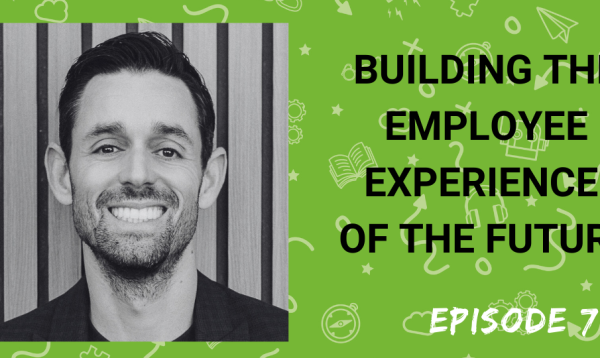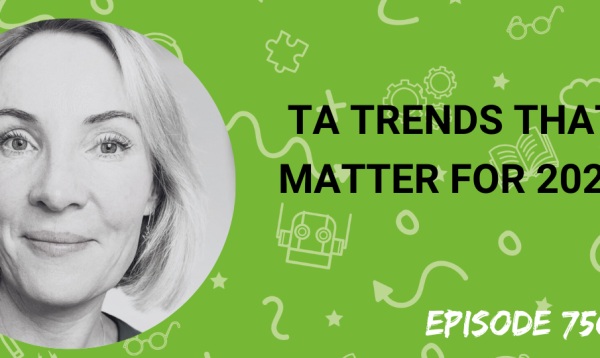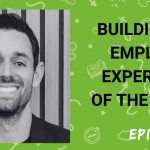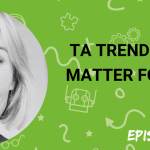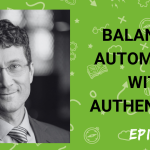In this episode Matt Alder talks to Nick Price of CareerGift.
The relationship between employer brand and candidate experience is a well documented one however despite this very few employers seem to consider the candidate experience to actually be part of their employer brand strategy.
In this interview Matt and Nick discuss the unbreakable relationship between employer brand strategy and candidate experience. Nick share his thoughts on the practical things companies can do to align one with the other and also talks about CareerGift’s unique offering which is helping employers deal with rejected candidates in a brand appropriate way
Subscribe to this podcast in iTunes
Transcript:
Matt Alder [00:00:00]:
Support for this podcast comes from Wreckfest 2. Wreckfest 2 is the in house recruitment event of the summer with an incredible lineup of speakers and the biggest conversation of like minded recruiters in the world. Wreckfest 2 is taking place on July 9th in London and is now sold out. Go to recfest2.com to join the waiting list or follow the conversation via Twitter and Periscope on the day itself.
Matt Alder [00:00:43]:
Hello and welcome to episode 18 of the Recruiting Future podcast. This week’s guest is Nick Price from Career Gift. I’ve known Nick for a very long time, having worked with him at TMP and then more recently on developing Mystery Applicant. Nick has some unique insight at the intersection of employer brand and the candidate experience, something he’s tapping into to develop CareerGift’s offering to help employers deal with rejected candidates.
Matt Alder [00:01:14]:
Hi everyone and welcome to another Recruiting Future podcast interview. My guest this week is Nick Price. Nick works for a new company to the market Career. Hi Nick, how are you?
Nick Price [00:01:29]:
I’m very well, thank you, Matt.
Matt Alder [00:01:30]:
Good stuff. Now we’ll talk a little bit more about Career Gift later, but for those people kind of not familiar with you, it’d be great if you could just talk about your background and the kind of things you’ve done and you know, what, what, what you’re sort of interested in in this space.
Nick Price [00:01:44]:
Yeah, okay. Yeah, I mean, I guess I’ve spent about 15 years working in the employer branding field in some, some shape or form. I guess my formative years were spent at TMP where we were one of the first organisations, I think, really to take research and employer branding seriously within the context of recruitment. In those days, research and recruitment didn’t necessarily go hand in hand because I remember talking to a lot of account managers and account directors about doing research with their clients and they gave me a funny look because it wasn’t a full page in the Sunday Times. And as we evolved that with companies taking it more and more seriously, understanding the messages that they need to, to deliver, to recruit the right people, employer branding kind of revolved around that sort of time. And we started working with companies such as IBM, who I think was one of the first big research projects that we did across Europe. That was really where I started my career. And as employer branding took off and more and more companies started to use it, we started to embrace more the internal side as well. So matching up that perception, that expectation that Potential job applicants would have would do reality what it was actually like working there. So I worked for TMP for some time, then worked as head of research at 33, where again we did a lot of interesting projects. We did projects around Europe and India again involving the employer branding and EVP work. And I guess really at that point I left 33 to plan my OFR if you like. I was quite keen to do more consultancy work and do more work around the communication side of employer branding as well. So we did a lot of film work. This is back 2007, 2008, when recruitment videos are still more one way traffic, if you like. They’re more about delivering a message rather than engaging with what the actual message of working for that organization would be like. So did that and then I became very much focused on the candidate experience piece because with employee branding, the candidate has a very valid view on what that organization is like, particularly from brand perspective. You know, their perception of why they’d want to work there, the expectation they’re going to have if they join. And really that started to sow the seed for when we set up Mystery Applicant, which was a candid experience feedback tool. And the thinking behind that was we were asked in so many ways for feedback in consumer society, if you like, you know, to rate your experience on things like eBay, Amazon, etc. But applying for a job is one of the most important things that you can do. And at the time people weren’t getting asked for feedback on that. So that was really where Mr. Applicant sat. And that’s still going strong. And really that’s where my focus has been the last three, four, five years. It’s really been on the candid experience element of employer branding, but making sure that this is all very much placed in the wider context of that employer brand piece.
Matt Alder [00:04:48]:
I work with you at TMP and we work together on Mystery Applicant as well. And I know that you’ve always had a very strong view about what employer branding is and what employer branding isn’t. What’s your definition of employer brand and how does that sort of dovetail into candidate experience? What is it that employers need to be aware of here?
Nick Price [00:05:14]:
Employer brand has had so many different types of definition and application in the last few years. I mean, we’re familiar with the way that it was first used as a term back in the 90s, but it’s really evolved, I think with more and more companies now are developing their employer value proposition in a more meaningful way. And employer branding has moved on from just being it’s what people say about you when you’re not in a room, et cetera. And there was a phase where nobody controls employees brand because everybody talks about it on social media. I think it’s actually about sound thinking led from the top around an organisation, its culture and the way it’s perceived and actually valued by the employees themselves.
Matt Alder [00:06:04]:
Where does the candidate experience fit with that? Why is it so important and what do employers need to be aware of?
Nick Price [00:06:12]:
I think particularly now hiring practices, just generally it’s become a more two way transparent relationship, if you like. Companies that take care of employer brand and improving how they treat candidates are therefore attracting better quality candidates. A candidate job applicant, they’ll already be forming a perception of that organisation before they’ve even applied and they’re visualising themselves in that role. So the way the candidate is then treated through that process is really important because those hopes can be dashed pretty quickly. And so the whole subject of candidate experience is a very important one. And in terms of how it fits with employee branding, I think we should also not forget that just applying for a job and going through the process, candidate experience doesn’t start or stop there. And there’s some interesting research I was reading done by the Aberdeen Group which I talked about the impact of onboarding. Onboarding is a vital part of that employer brand’s experience. You could argue that some people actively say they do it, but pretty much everybody does it, even if they do it badly. And what Aberdeen Group did was look at the impact of onboarding effectiveness and those in the bottom 30% of how they scored. This piece of analysis defined as the onboarding laggards retained only 30% of their employees after one year, whereas those in the top 20% retained 91% of their first year employees. So when we talk about can experience we shouldn’t just talk about it in isolation because it has a big impact on your ability to not only recruit the right people but also done properly or so to retain the right people.
Matt Alder [00:08:02]:
That’s really interesting. I’d not come across that particular angle on it before and interesting to hear those stats from your experience of sort of working with lots of companies in this space and you know, obviously having, having huge amounts of exposure to stats via the things that you’ve been, you know, researched by the things you’ve been working on. What, what do employers need to do this? Well, what are your sort of, you know, your top tips, if you like, in terms of providing a better candidate experience?
Nick Price [00:08:41]:
I guess the first point is start by thinking about the numbers that are coming into contact with your brand and how you’re going to manage that experience. The Candid Experience Awards and the Talent Board have done a lot of research into this area and some really useful stats. One of those stats was that over half of candidates have some relationship with a hiring organization and this is likely to be even higher if it’s retail group, for example, with large volume hires. So the first thing is to think about how you’re actually treating those that aren’t successful. And I think when we talk about candid experience, we often talk about making the process better and a lot of organisations frame their offering around that. But I think it goes far beyond that. Again, some interesting research showed that nearly half of the people that apply for jobs are looking at the values when they research your organisation. So those values have to be reflected in terms of your behaviours, your process and how you’re treating those candidates. Thinking about the candidates you don’t hire, how do you manage their hopes and expectations? You know, put yourself in their shoes. Be clear on setting expectations. Align your behaviours and messaging with your EVP and your employer brand. 43% of candidates experience discrepancies between job descriptions and what they actually end up doing. Nobody wants those kind of surprises. So I think be realistic, be transparent and be honest and I think, you know, be considerate of your candidates time and efforts. Now we know that indeed, for example, in other sites make it a lot easier to apply now. And there are a lot of candidates that may fire off a lot of quick applications, but there’s a lot of people that dedicate a lot of time to applying for a job. And I think recognizing that effort and input is really important. I read another stat that said 74% of data collected by companies on candidates is not even used in the selection process. 38% of candidates surveyed in the Candidate Experience Awards received any information prior to their actual interview. The only information they got was the date and location. Think about that relationship you’re building with those candidates as they apply and offer feedback where possible. I know this isn’t always practical, but there are tools there that can help you. The final sort of point on all this is measure it. Don’t just measure it though, listen to it and action it and put the right interventions in place to consistently improve the candidate experience. 75% of candidates surveyed by the Talent Board were never asked about their experience before they received that survey. We’re talking about HR technology, we’re talking about data, we’re talking about candidate experience being Big topics and yet not enough organizations are getting regular feedback and acting on it and actually making it a real, you know, a measurable business management tool.
Matt Alder [00:11:39]:
I think that’s really interesting because I think that a lot of the talk and focus on candidate experience is all about small, practical things that sometimes are very difficult to implement. And I think what you’ve illustrated there is that this is a strategic decision that fits alongside an employer brand strategy. And it’s not necessarily easy to do, but there is data that you can collect and the benefits of paying time and attention to this in terms of recruitment ROI are quite big. Could you just to kind of finish off, could you just sort of tell us a little bit about CareerGift?
Nick Price [00:12:23]:
Okay. Yeah. So talking about the number of people that come into contact with your brand but don’t actually aren’t actually successful in their application. Career Gift is an online career management toolkit to help people get the job they want. So every candidate that applies to your organization will get a link and access to Career Gift. So for all those people that weren’t successful on this particular occasion, you’re effectively giving them a gift and access to the courier gift portal. And our view is that it’s an opportunity to give something back, but it’s also a very important and fundamentally good thing to do. They can go away better equipped in the job hunting world and improves their relationship with your brand and they may well come back further down the line as a better candidate and become successful with you. So it’s a way of maintaining your good brand relationship with the candidate and job applicants and building a positive association with that application experience.
Matt Alder [00:13:26]:
So basically it’s content to help job seekers with their job search. That’s kind of branded by the company they’ve applied to.
Nick Price [00:13:35]:
It’s jointly branded with CareerGift. Every candidate can go away and have access to Career Gift and it’s basically sponsored by that organization.
Matt Alder [00:13:43]:
Fantastic.
Matt Alder [00:13:44]:
Well, best of luck with Career Gift and thank you very much for talking to me.
Nick Price [00:13:50]:
Thanks, Matt. Cheers.
Matt Alder [00:13:52]:
My thanks to Nick Price. You can subscribe to this podcast in itunes or Stitcher. You can listen to past episodes and read show notes@www.rfpodcast.com and also subscribe to our mailing list there to get exclusive content and find out about future guests. Thanks for listening. I’ll be back next week and I hope you’ll join me.


